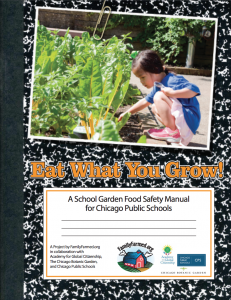 Eat What You Grow! produced a comprehensive list of required food safety protocols for garden operators. By having a set of approved guidelines that all garden participants and foodservice staff implement, school gardens can safely supply our school cafeterias with student and community grown produce and will assure school administrators, teachers, parents and students that the produce grown is handled with the utmost attention to safety. Note that these standards are based on guidelines for Chicago Public Schools. View Resource »
Eat What You Grow! produced a comprehensive list of required food safety protocols for garden operators. By having a set of approved guidelines that all garden participants and foodservice staff implement, school gardens can safely supply our school cafeterias with student and community grown produce and will assure school administrators, teachers, parents and students that the produce grown is handled with the utmost attention to safety. Note that these standards are based on guidelines for Chicago Public Schools. View Resource »
High Tunnels
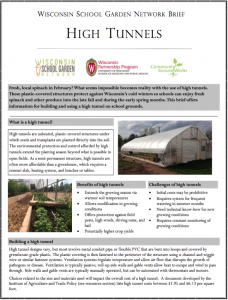 Fresh, local spinach in February? What seems impossible becomes reality with the use of high tunnels. These plastic-covered structures protect against Wisconsin’s cold winters so schools can enjoy fresh spinach and other produce into the late fall and during the early spring months. This brief offers information for building and using a high tunnel on school grounds. Download Brief »
Fresh, local spinach in February? What seems impossible becomes reality with the use of high tunnels. These plastic-covered structures protect against Wisconsin’s cold winters so schools can enjoy fresh spinach and other produce into the late fall and during the early spring months. This brief offers information for building and using a high tunnel on school grounds. Download Brief »
Constructing a Simple PVC High Tunnel
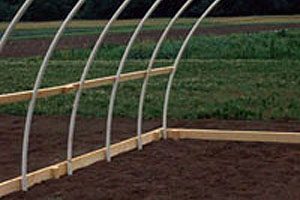 This low-cost, 30’ long by 18’ wide PVC high tunnel is constructed using PVC pipe for hoops. A crew of four can easily construct a high tunnel of this design in a single day, and a single person can do the majority of the construction! View Resource »
This low-cost, 30’ long by 18’ wide PVC high tunnel is constructed using PVC pipe for hoops. A crew of four can easily construct a high tunnel of this design in a single day, and a single person can do the majority of the construction! View Resource »
Growing School Gardens: Annie’s How-to Guide for Five Kinds of Children’s Gardens
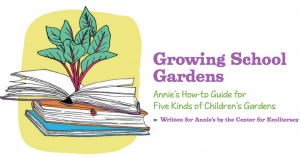 This guide offers five examples of different gardens—from simple to complex—that can flourish at schools and other learning environments with the hope that at least one of these examples will fuel your motivation to garden with kids: windowsill gardens, vertical gardens, raised beds/container gardens, cold frames/tunnels/greenhouses, and large-scale gardens. View Resource »
This guide offers five examples of different gardens—from simple to complex—that can flourish at schools and other learning environments with the hope that at least one of these examples will fuel your motivation to garden with kids: windowsill gardens, vertical gardens, raised beds/container gardens, cold frames/tunnels/greenhouses, and large-scale gardens. View Resource »
Is a High Tunnel Right for your Farm?
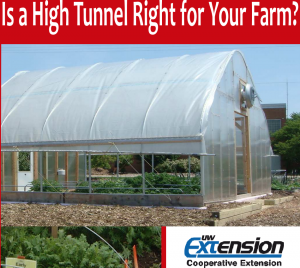 This manual is designed to help you make an informed decision as to whether or not a high tunnel will benefit your business operation. It examines human resources, site requirements, and the initial costs associated with a high tunnel. View Resource »
This manual is designed to help you make an informed decision as to whether or not a high tunnel will benefit your business operation. It examines human resources, site requirements, and the initial costs associated with a high tunnel. View Resource »
